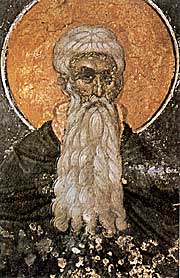Arsenius the Great
| Saint Arsenius | |
|---|---|

Fresco at mount Athos, 14th century
|
|
| the Deacon, the Roman, the Great | |
| Born | 350-354 Rome |
| Died | 445 Troe, Egypt |
| Venerated in |
Roman Catholic Church Eastern Orthodox Church Oriental Orthodox Churches |
| Canonized | pre-congregation |
| Feast | May 8 (Eastern Orthodox Church and Roman Catholic Church) 13 Pashons (Coptic Orthodox Church) |
Saint Arsenius the Deacon, sometimes known as Arsenius of Scetis and Turah, Arsenius the Roman or Arsenius the Great, was a Roman imperial tutor who became an anchorite in Egypt, one of the most highly regarded of the Desert Fathers, whose teachings were greatly influential on the development of asceticism and the contemplative life.
His contemporaries so admired him as to surname him "the Great". His feast day is celebrated on May 8 in the Roman Catholic Church and in the Eastern Orthodox church, and on 13 Pashons in the Coptic Orthodox Church.
He was born in 350 AD, in Rome to a Christian, Roman senatorial family. After his parents died, his sister Afrositty was admitted to a community of virgins, and he gave all their riches to the poor, and lived an ascetic life. Arsenius became famous for his righteousness and wisdom.
There is considerable debate regarding the accuracy of several points in Arsenius's life. Arsenius is said to have been made a deacon by Pope Damasus I who recommended him to Byzantine Emperor Theodosius I the Great, who had requested the Emperor Gratian and Pope Damasus around 383 to find him in the West a tutor for his sons (future emperors Arcadius and Honorius). Arsenius was chosen on the basis of being a man well read in Greek literature. He reached Constantinople in 383, and continued as tutor in the imperial family for eleven years, during the last three of which he also had charge of his original pupil Arcadius's brother, Honorius. Coming one day to see his sons at their studies, Theodosius found them sitting while Arsenius talked to them standing. This he would not tolerate, and caused the teacher to sit and the pupils to stand. On his arrival at court Arsenius had been given a splendid establishment, and probably because the Emperor so desired, he lived in great pomp, but all the time felt a growing inclination to renounce the world. While living in the Emperor's palace, God gave him grace in the sight of everyone, and they all loved him. He lived a lavish life in the palace, but all the time felt a growing inclination to renounce the world. One day he was praying, and said, “O God teach me how to be saved.” And God’s voice came to him through the Gospel, "For what is a man profited, if he shall gain the whole world, and lose his own soul?" (Matthew 16:26). He left Constantinople and came by sea to Alexandria and fled into the wilderness. When he first presented himself to Saint Macarius the Great, the father of the monks of Scetis, he recommended him to the care of Saint John the Dwarf to try him.
...
Wikipedia
